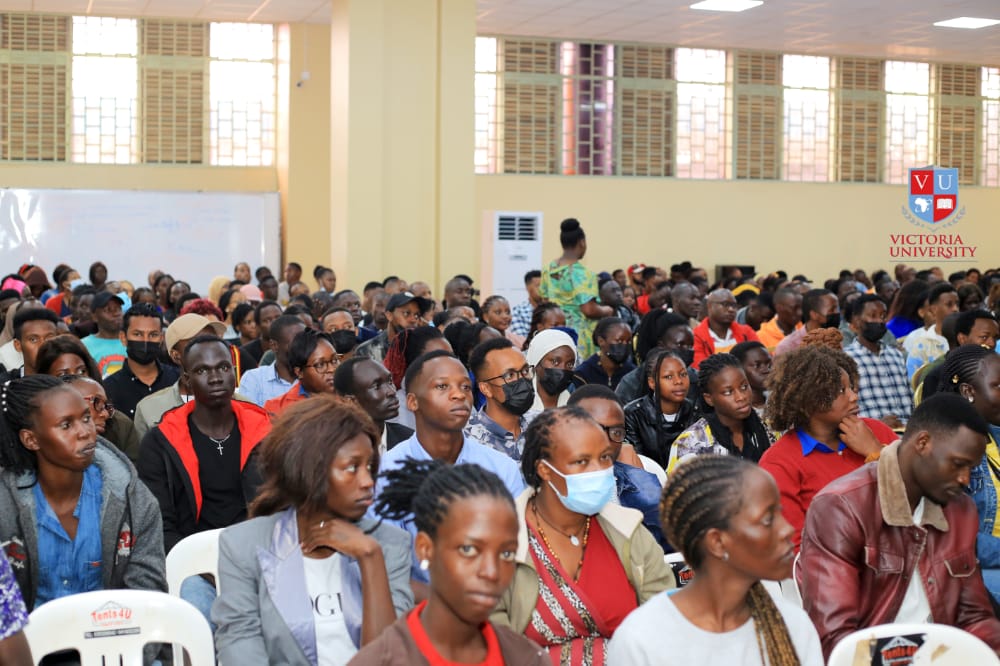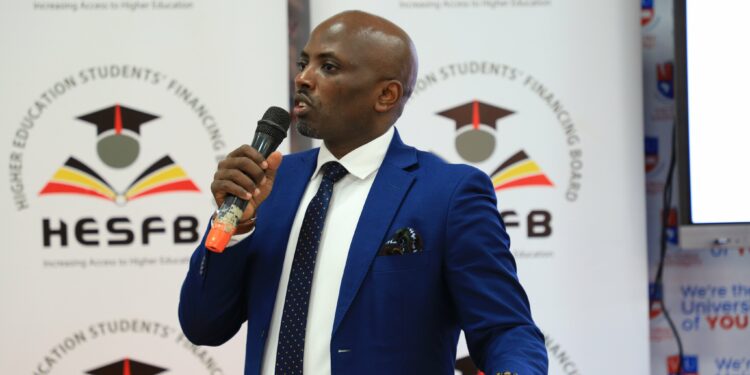Victoria University is continuing to foster inclusivity in the attainment of quality education for all students in Uganda, this time with an impressive initiative, the Students Loan Scheme.
It is a clear testimony that learners from financially struggling families will now afford quality education at the University, using funds from this financial initiative launched yesterday at the campus main auditorium, in partnership with Higher Education Students Financing Board (HESFB).
This, coupled with the most affordable tuition fares charged by the institution, in addition to catering for learners who failed to attain two principal passes at A’ level to join university, parades the kind of inclusivity in provision of access to higher education, never seen before at any university in Uganda.
“You have no excuse that you can’t afford the affordable tuition, then if you can’t afford the affordable tuition, you have a financing agency to rescue your dream,” Dr. Lawrence Muganga, the University Vice Chancellor talked plainly to new students for the August -September intake.
Dr. Muganga supplied a ray of hope to several learners in Uganda who had given up on their dreams of joining the University after failure to attain two principal passes at A’ level in secondary school. He made it clear that the campus he leads has a unique initiative to facilitate their admission to university.
“You have one principal pass, please embrace what Nation Council for Higher Education has created, it is called HEC ie Higher Educational Certificate, come to Victoria University, we will work to prepare you, in a period of simply 8 months and you will be ready to join the University, and if you don’t have the money, HESFB will come to your rescue, there is nothing like failing here, its our responsibility to make sure that you succeed,” Dr Muganga further elaborated.
The launch of the Students Loan Scheme was an impressive milestone reached by the institution, which makes it part of 22 other Universities in the country running the same initiative funded by the government of Uganda.
Aiding financially struggling learners in their efforts to raise tuition was confirmed after the signing of a Memorandum of Understanding (MoU) between the institution and HESFB at the University main auditorium.

It follows the University attainment of a Charter status, after it was cleared by the National Council for Higher Education (NCHE) and endorsed by President Yoweri Museveni on July 31st, 2022.
The MoU spells out the rights of HESFB as the funding body, rights of the University as the entity that offers learning, and the rights of the student. It is a document which formalizes the relationship between the board and the university, on top of binding the students to be part of the board itself.
The decision by HESFB to envelope Victoria University in a group of institutions legible to operationalize the Students Loan Scheme was greenlighted due to the institution’s attainment of a charter status, and also because of students high drop out rates at various institutions of higher learning.
This kind of inclusivity in provision of quality higher education makes Victoria University exceptional and a model institution of higher learning in the country, giving it a trump card other universities simply don’t match.
Worth noting, the institution offers a unique kind of education that fits anyone who lives today in this world driven by technology, meaning it empowers all learners with digital competencies that are required for them to thrive in this digital economy.
While addressing the University new students for the August -September intake for the academic year 2022/23, Mr. Michael Wanyama the Executive Director for HESFB congratulated these learners upon making it to the university, and also lauded the University for being among a few institutions in Uganda that has increased students provision to higher education.
” I want to congratulate you first and foremost again because when you look at how education is inclined in this country, you are among the very few to reach this far, in terms of statistics I think our growth enrollment has now moved from 6.2 to 6.8% meaning it’s 6.8 out of 100 who reach there,” said Mr. Wanyama.
He noted that government’s intervention in financially aiding students learning endeavors is occasioned by failure of some to raise the learning fees, evidenced by high rates of dropouts at university and other tertiary institutions.
About Higher Education Students Financing Board
HESFB was launched in the 2014/2015 academic year by the President of Uganda HE Gen. Yoweri Museveni with over 1,201 beneficiaries.
It was established with a prime aim of supporting brilliant students who have been admitted on accredited study programs in a chartered university, but lack access to enough funds to facilitate their education.
HESFB is a government agency that falls under the Ministry of Education and Sports, mandated per law to give out loans and scholarships to learners pursuing higher education at universities or other tertiary institutions that offer degrees and undergraduate diplomas in Science, Technology, Engineering and Mathematics (STEM)
The initiative largely support sciences but also has a small window for people who may not have done sciences at A’level, to offer programs like Information Technology (IT), in addition to Tourism and Hospitality Management.
Students with disabilities (PWD’s) are eligible to pursue any study programs of their choice in either sciences or humanities, as opposed to other students. The loan covers tuition, functional fees, research fees but it has been modified to also include money for students living expenses like accommodation.
Other requirements
“You need no security, not like the commercial loan where you need security, you don’t need guaranters, its an online application,” remarked Mr. Nuwagira Bob, the Pubic Relations Officer for HESFB.
Other requirements needed include;
A scanned admission letter to a higher education institution.
A national identity card or the enrollment form you got from NIRA when you were applying for an ID.
Copies of national IDs for parents , O’ and A level certificates.
A birth certificate.
One is also mandated to supply a map leading to their home as a verification method to establish his/her origin. In this case, the student is required to supply a map to their current address and another to their place of origin.
Do you have a story in your community or an opinion to share with us: Email us at editorial@watchdoguganda.com








